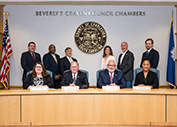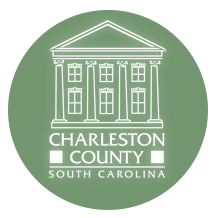Food Waste Composting In School Cafeterias

Charleston County Environmental Management Department's Greening Schools Program has collaborated with Charleston County School District (CCSD) to divert food waste generated in school cafeterias from the landfill.
In September 2012, Lambs Elementary School was the first school to participate in a food waste diversion pilot program utilizing a 3-way sort collection station in the cafeteria. Ten additional schools were added during the 2012-2013 school year to participate in this pilot. Based on the success of the food waste diversion pilot, CCSD has recognized the benefits of food waste composting and has turned the pilot into a program by modifying the structure of their MSW management contract to include food waste collection services. The program expanded to include 33 schools by the end of the 2013-2014 school year. Ten elementary schools and eight middle schools are scheduled to be added for the 2014-2015 school year.

Check out the cover story of the May 2014 edition of BioCycle Magazine to learn more!
For more information on the amount of food waste diverted from the landfill or the educational material used by CCSD to implement this program please click on the following CCSD website link:
More CCSD Info

How does the program work?
A collection station located in the cafeteria consists of 3 separate containers for students to place items marked for food waste, recyclables and trash.
The food waste container is lined with a compostable bag. When the cart is full, it is rolled outside to be serviced by the District's food waste hauler, Food Waste Disposal. The food waste, collected every other day, is then delivered to the County's Bees Ferry Composting Facility where it is mixed with yard waste to be processed into compost which is available for purchase and use in the community.
The collection of food waste is an extension of on-going efforts to collect recyclables and reduce waste by tapping and stacking Styrofoam lunchroom trays. Styrofoam does not weigh a lot, but is voluminous. The end result of "tap and stack" is that the stacked trays take up less space in the trash which ultimately saves spaces in the landfill.

What are the benefits of composting food waste in the cafeterias?
Since the pilot kicked off in September 2012, almost all of the participating schools have had at least one or two reductions in the number of days their MSW dumpster is serviced. This change in frequency of MSW service translates into financial savings on the District's solid waste disposal fees.
Diverting food waste from the landfill extends the life of the landfill by saving space. Additionally, composting food waste reduces harmful greenhouse gas emissions that contribute to global climate change.
Lastly, another benefit of this program is that as students are introduced to the concept of food waste composting, separating waste for recycling becomes an invaluable hands-on learning tool.


Notes For Parents:
- When possible, try to purchase food items that are not packaged in non-recyclable materials such as plastic wrappers and sandwich bags.
- Sending food items in a reusable lunch box or brown paper bag helps reduce the amount of waste sent to the landfill. Brown paper bags are compostable.
- Start your own compost pile at home to use as fertilizer for your home garden. Click here for tips to get started.
How to "Sort-It-Out" In The Cafeteria
Landfill:
- packaged wrappers
- plastic utensils
- Capri sun pouches
- condiment packs
- Zip-lock bags

Recycling:
- plastic yogurt cups
- fruit cups
- Lunchable trays
- plastic bottles
- cans

Compost:
- milk cartons
- napkins
- all food waste





